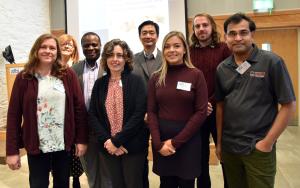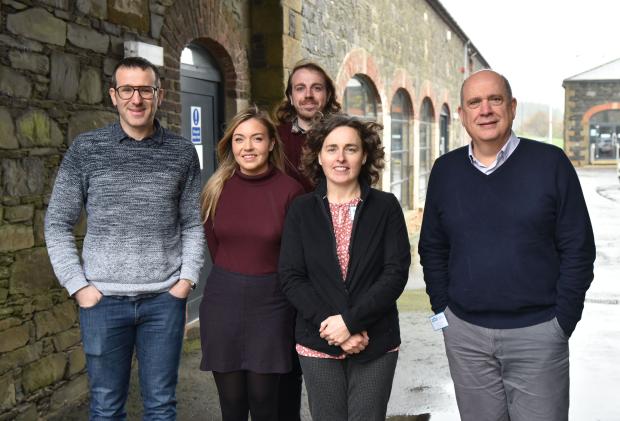AFBI seminar presents latest poultry science research findings to industry
Date published:
The Agri-Food and Bioscience Institute (AFBI) recently hosted a seminar highlighting recent findings from several projects.

The seminar was entitled “Transatlantic poultry science research” and featured key-note speakers from AFBI, The Queen’s University of Belfast and the University of Georgia, USA.
Dr Elizabeth Magowan (AFBI Director) welcomed the attendees and highlighted that the research presented was a major step towards sustainable poultry production and was confident that the findings of the work would be adopted widely and quickly within the industry locally, nationally and internationally. She acknowledged the role of the AFBI/QUB Alliance in driving forward important collaborative research which will assist the poultry industry in meeting the challenges of sustainable production.
The seminar was chaired by Dr Claire Anderson (College of Agriculture, Food and Rural Environment, CAFRE). CAFRE play an essential role in transferring research findings to industry in addition to their education and training responsibilities.

In the partnership parallel trials were being conducted at AFBI and the University of Georgia. With the first stage of the project nearing completion, some promising results are becoming apparent which will support the drive to reduce the negative impact of coccidiosis in broilers.
Professor Woo Kim from the University of Georgia, USA, presented his research on nutrition and bone health in laying hens. He focussed on calcium, 25-hydroxy vitamin D and polyunsaturated fatty acid (PUFA) nutrition and their effect on bone health, density and quality. His take-home message was that it is essential to maximise bone quality before the on-set of lay and that targeted supply of 25-hydroxy vitamin D and PUFA have the potential to improve leg and keel bone health.
Dr Victoria Smyth (AFBI) continued the theme of reducing disease pressures in poultry systems and presented her work on chicken astrovirus and white chick hatchery disease. Dr Smyth was able to show the link between the virus and the hatchery disease and provide evidence that the virus is vertically transmitted from hens to eggs. These findings have been of benefit in the fight against the detrimental effect of the hatchery disease.
Dr Oluyinka Olukosi (University of Georgia) began the second session of the seminar with a focus on reducing the environmental impact of production. His presentation emphasised the importance of phosphorus (P) in broiler diets and how overall P utilisation can be improved through the use of the enzyme phytase.
Drs Christina Mulvenna and Elizabeth Ball (AFBI) then presented recent findings from a project to establish an up-to-date ammonia emission factor from broiler production. Ammonia emissions are linked to dietary crude protein intake and nitrogen excretion and their work has shown that the ammonia emission factor was 29% lower than the previous standard value. This reduction was attributed to advances in broiler genetics, nutrition and management. The new value has been adopted by the Northern Ireland Environment Agency and is currently in use to inform planning decisions and provide a base-line to assess further ammonia mitigation strategies.
The final presentation of the day was delivered by Professor Ilias Kyriazakis (QUB) who focussed on nutritional and breeding options to reduce the environmental impact of poultry systems. Professor Kyriazakis discussed the importance of genetic change and implications on performance; if reducing the environmental impact of production is an objective, then genetic change should maintain or improve performance. As most of the carbon footprint of poultry systems is associated with feed production, alternatives to imported soybean meal need to be identified. However, these alternatives may not reduce overall nitrogen excretion, and therefore, he highlighted the need for a balanced approach when considering the environmental impact of poultry systems.
Notes to editors:
AFBI is an arms-length body of DAERA delivering research and development, diagnostic and analytical testing, emergency response capability and expert scientific advice for DAERA and other government departments, public bodies and commercial companies in Northern Ireland, and further afield.AFBI’s Vision is “Scientific excellence delivering impactful and sustainable outcomes for society, economy and the natural environment”.AFBI’s Purpose is “To deliver trusted, independent research, statutory and surveillance science and expert advice that addresses local and global challenges, informs government policy and industry decision making, and underpins a sustainable agri-food industry and the natural and marine environments”.AFBI’s core areas:Leading improvements in the agri-food industry;Protecting animal, plant and human health;Enhancing the natural and marine environment.